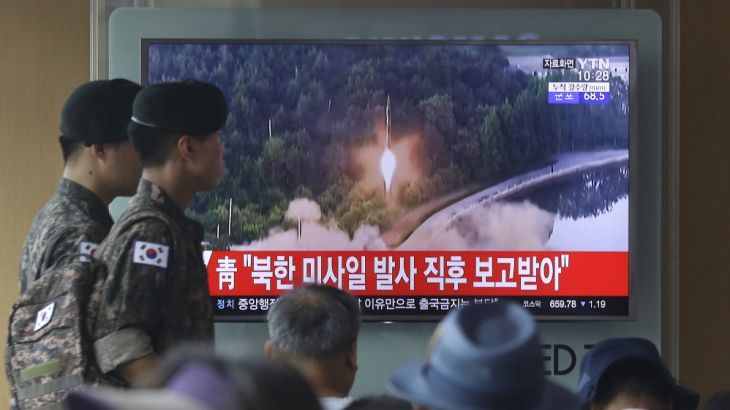North Korea claims test of intercontinental missile
Pyongyang launches ballistic missile that flew for nearly 40 minutes before coming down in the Sea of Japan.

North Korea says it has successfully tested its first intercontinental ballistic missile (ICBM) under the supervision of leader Kim Jong-un, and that it was capable of hitting anywhere in the world.
The Hwasong-14 missile reached an altitude of 2,802km and hit its target precisely after flying for 39 minutes, the North’s state television said.
The missile was launched from country’s western region into the sea off its east coast on Tuesday, according to officials in South Korea and Japan.
|
|
The “unidentified ballistic missile” was fired at around 00:40 GMT from a site near Banghyon in North Pyongan province and flew about 930 kilometres, coming down in the Sea of Japan, South Korea’s military said in a statement.
US Secretary of State Rex Tillerson confirmed on Tuesday that North Korea has test-launched an intercontinental ballistic missile for the first time.
“The United States strongly condemns North Korea’s launch of an intercontinental ballistic missile. Testing an ICBM represents a new escalation of the threat to the United States, our allies and partners, the region, and the world,” Tillerson said in a statement.
He added that the US “will never accept a nuclear-armed North Korea”.
The US had initially rebutted North Korea’s claim that the missile was an ICBM.
Japan’s Chief Cabinet Secretary Yoshihide Suga told reporters the missile flew for 40 minutes – an unusually long flight time.
“This launch of a ballistic missile can never be tolerated, and Japan strongly protested to North Korea and condemned it,” he told a briefing.
READ MORE: North Korea threat boosts bomb shelter sales in Japan
The United Nations Security Council will hold an emergency meeting on Wednesday.
UN Secretary-General Antonio Guterres strongly condemned the launch, warning that it “constitutes a dangerous escalation of the situation”.
North Korea’s missile launch is the first since Pyongyang fired several cruise missiles in early June and comes as leaders of the US, United States, China, Japan and South Korea are expected to discuss efforts to rein in the North’s nuclear and missile tests at the G20 summit in Hamburg, Germany on July 7 to 8.
“Today’s achievement for North Korea is important because it’s the first time they have successfully tested a missile that can reach a distance as long as about 6,500 kilometres, which means it has already crossed the threshold for ICBM,” Tong Zhao, a specialist on nuclear defence and proliferation, told Al Jazeera from Beijing.
“This actually is an opportunity for North Korea to claim victory and therefore be willing to consider a near-term agreement to stop further nuclear and missile tests,” said Tong.
But despite the country’s developments, Tong said North Korea can still not reach the homeland of the US which is at least 8,000 kilometres away.
Japanese Prime Minister Shinzo Abe said the latest missile launch “clearly showed increasing threats” from Pyongyang.
“Once again, North Korea pushed ahead with a missile launch. That showed [Pyongyang] has ignored repeated warnings from the international community,” Abe told reporters.
The launch is part of a string of test-firings in recent months as the North works to build a nuclear-tipped missile that could reach the US.
|
|
Tuesday’s launch is the first by North Korea since the June 8 test of a new type of cruise missile that Pyongyang says is capable of striking US and South Korean warships “at will”.
The incident also comes just days after Seoul’s new leader Moon and US President Donald Trump focused on the threat from Pyongyang in their first summit.
Since taking office on May 10, Moon has tried to improve strained ties with North Korea, but the North has continued its missile tests.
“President Moon has been talking about increasing engagement with North Korea, but a scale-back of its nuclear programme is a condition of that and President Trump seems to have been indicating that the US is losing patience with North Korea,” Al Jazeera’s Kathy Novak, reporting from Seoul, said.
Tuesday’s missile launch also comes before July 4 Independence Day celebrations in the US. North Korea has previously fired missiles around this US holiday.
The launch also comes a day after China warned that if tensions in the region continued to escalate, the situation could “get out of control” with “disastrous” consequences.
China’s ambassador to the UN, Liu Jieyi, also said that Beijing would push for the US and South Korea to halt military exercises on the Korean Peninsula in exchange for North Korea suspending its nuclear and ballistic missile programmes.
Trump took to Twitter in response to North Korea’s latest missile launch.
North Korea has just launched another missile. Does this guy have anything better to do with his life? Hard to believe that South Korea…..
— Donald J. Trump (@realDonaldTrump) July 4, 2017
….and Japan will put up with this much longer. Perhaps China will put a heavy move on North Korea and end this nonsense once and for all!
— Donald J. Trump (@realDonaldTrump) July 4, 2017
The Trump administration, which has repeatedly warned that the “era of strategic patience” with Pyongyang is over, has turned to China for help in reigning in the nuclear threat from North Korea.
But frictions between the two powers, including over the South China Sea and Taiwan, have impeded discussions.
After Trump’s tweets calling on China to take more action, China defended its efforts to resolve the North Korea nuclear issue.
“China has made relentless efforts for the settlement of the Korean peninsula nuclear issue. China’s contribution in this regard is well recognised, and its role is indispensable,” foreign ministry spokesman Geng Shuang said.
